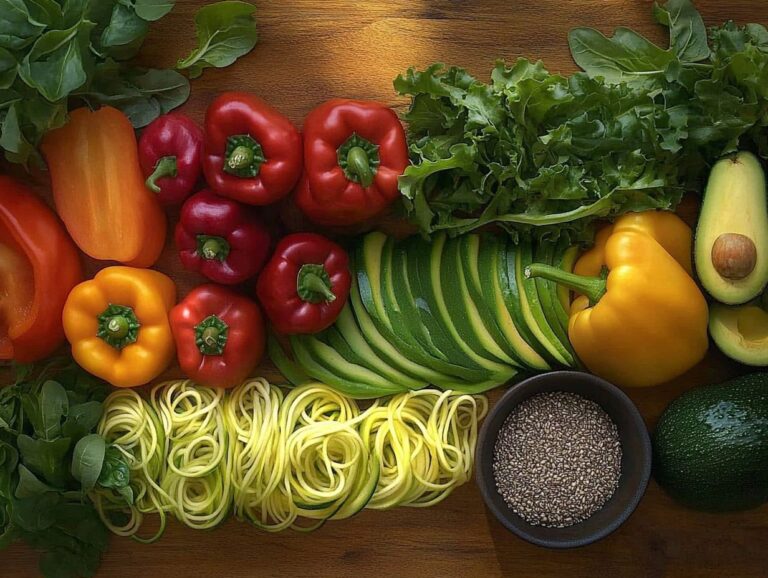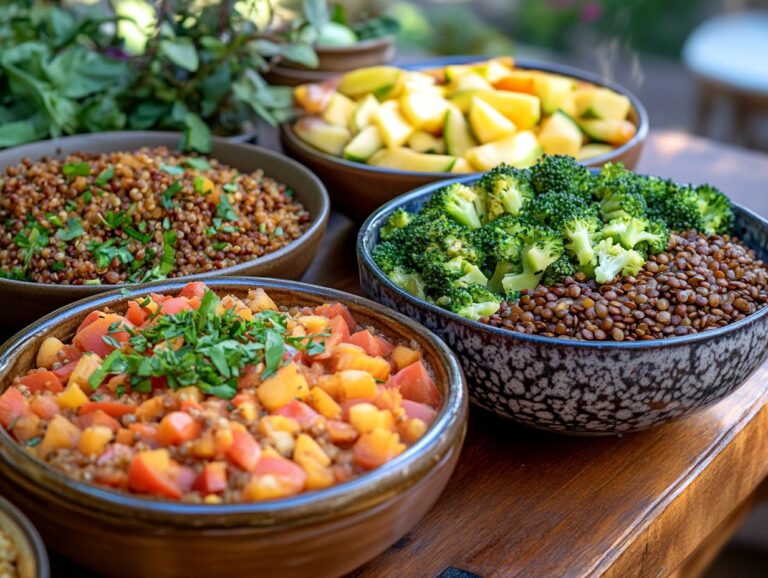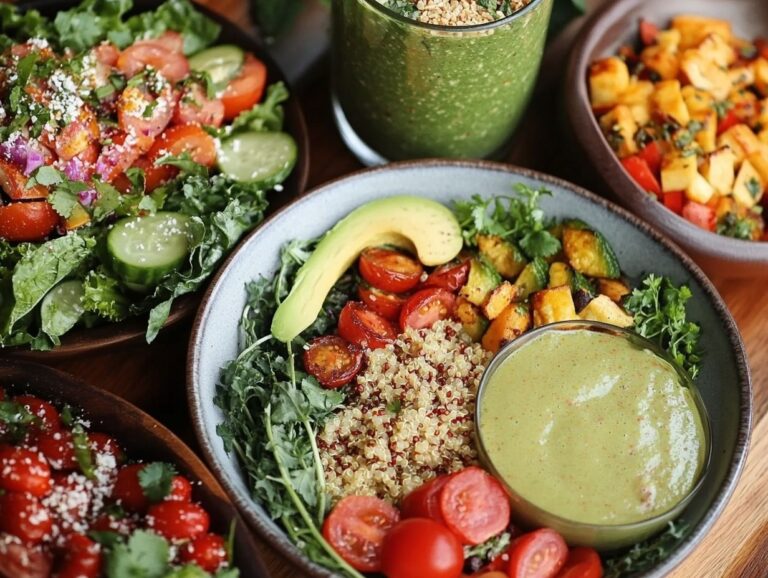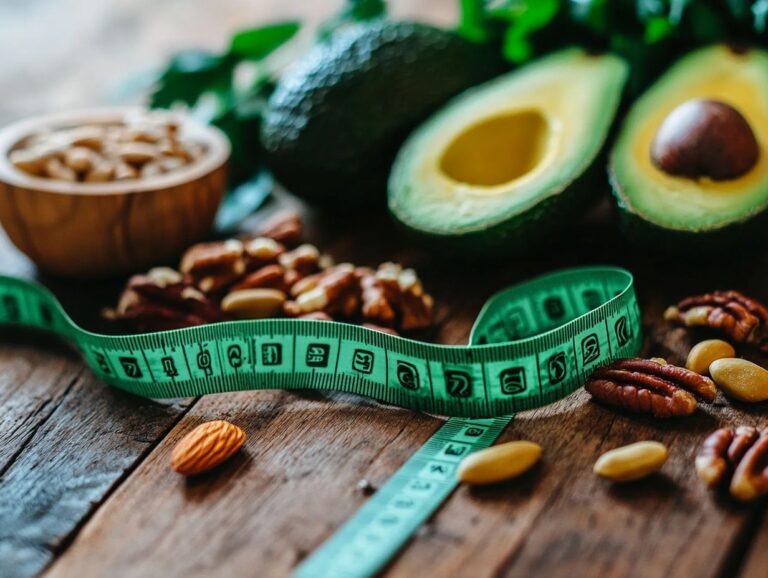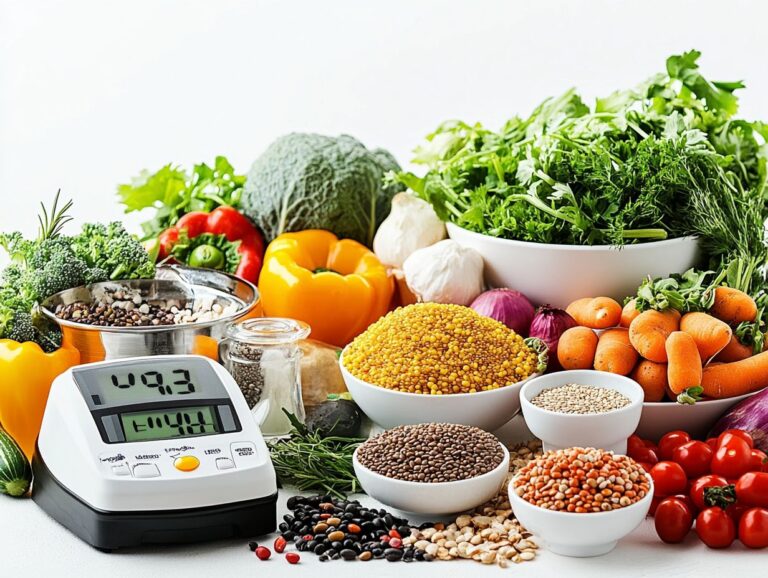The Vegan AIP diet merges the principles of veganism with the Autoimmune Protocol (AIP), creating a distinct dietary approach that aims to reduce inflammation and enhance overall health. This article explores the benefits of the Vegan AIP diet, outlines which foods to include and avoid, and provides guidance on how to practically implement this dietary strategy.
Key Takeaways:
- Focusing on nutrient-rich, whole foods can reduce inflammation, improve gut health, and increase nutrient intake on a vegan AIP diet.
- Avoiding grains, legumes, nightshade vegetables, and processed foods is key to successfully following a vegan AIP diet.
- To successfully follow a vegan AIP diet, educate yourself on AIP principles, create a meal plan, shop for AIP-friendly foods, cook your meals, and listen to your body.
What Is a Vegan AIP Diet?
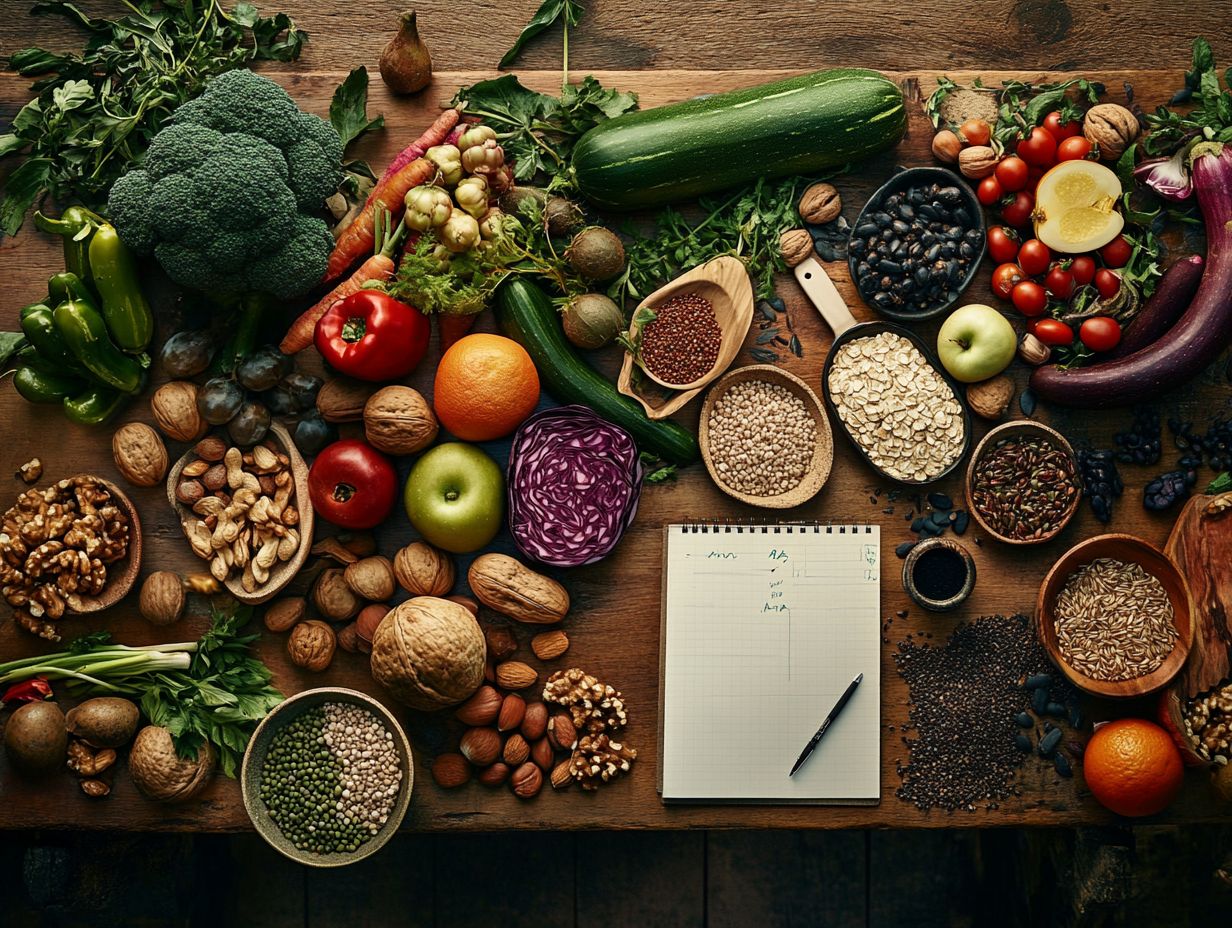
The Vegan AIP Diet is a hybrid of the Autoimmune Protocol (AIP) Diet designed to reduce inflammation by eliminating dietary triggers for individuals with autoimmune conditions such as rheumatoid arthritis, lupus, Hashimoto’s thyroiditis, inflammatory bowel disease, and celiac disease.
Its primary goals are to decrease chronic inflammation, enhance gut health, and optimize nutrient intake through a diverse range of plant-based sources. AIP diets are rich in nutrients and aim to alleviate symptoms experienced by those with autoimmune diseases.
By combining elements of both vegan and paleo diets, the Vegan AIP Diet offers a unique approach that can improve the quality of life for individuals with autoimmune disorders.
What Are the Benefits of Following a Vegan AIP Diet?
The health benefits of following a Vegan AIP Diet are numerous and can significantly enhance the quality of life for individuals with autoimmune disorders.
These benefits include:
- Reduced inflammation, which is crucial for managing chronic inflammation.
- Improved gut health due to an emphasis on nutrient-dense foods that support the functioning of the digestive tract.
- Increased nutrient intake, ensuring that specific dietary needs are met for optimal health in the body.
By implementing these dietary strategies, individuals can anticipate fewer food reactions and better symptom management.
1. Reduced Inflammation
One of the main benefits of the Vegan AIP Diet is its ability to limit inflammation, which is particularly important for individuals with autoimmune conditions such as inflammatory bowel disease and celiac disease.
This diet eliminates inflammatory food triggers like grains, legumes, nightshade vegetables, dairy, and processed sugars, thereby reducing inflammatory responses and alleviating symptoms of chronic inflammation.
The Vegan AIP Diet emphasizes nutrient-dense foods, particularly those high in antioxidants and healthy fats. These specific dietary components directly influence inflammation at the cellular level. Antioxidants, abundant in fruits and vegetables, provide protection against oxidative stress, a contributing factor in many autoimmune conditions.
By neutralizing free radicals, antioxidants help reduce tissue damage and promote a balanced immune response. Additionally, healthy fats, such as omega-3 fatty acids found in flaxseeds and walnuts, modulate inflammatory pathways, which helps to decrease the hyperactive immune responses often seen in these diseases.
Incorporating such nutrient-rich foods not only aids in reducing inflammation but also supports overall health, which is crucial for those facing the complex challenges of autoimmune conditions.
2. Improved Gut Health
The Vegan AIP Diet significantly enhances gut health by addressing issues like leaky gut, which can exacerbate autoimmune disorders. This improvement is largely attributed to the strong focus on high-fiber dietary sources that promote proper digestion and foster the growth of beneficial gut bacteria, ultimately enhancing the overall immune response.
Essential staples of the AIP diet, such as vegetables, fruits, and bone broth, play a vital role in maintaining gut health and function. Additionally, this diet helps reduce inflammation and promotes a diverse microbiome, both of which are crucial for mitigating the degenerative effects of autoimmune disorders.
The inclusion of a variety of AIP-friendly foods, such as sweet potatoes, kale, and avocados, ensures nutritional diversity and provides the necessary components for gut healing. Foods rich in antioxidants, like berries and leafy greens, further support the body’s defense mechanisms.
Therefore, dietary variety and adequate fiber intake have a significant impact on gut health and should be incorporated into the diet of individuals with autoimmune disorders.
3. Increased Nutrient Intake
Another positive aspect of the Vegan AIP Diet is its ability to increase nutrient intake, which is crucial for individuals with autoimmune diseases who are at risk for nutrient deficiencies.
This diet promotes dietary diversity and balance by emphasizing plant-based foods, including vegetables, fruits, and healthy fats, all of which provide essential vitamins and minerals necessary for proper functioning and overall health.
Such a nutrient-dense eating approach helps enhance immune response, supports overall well-being, and may influence disease progression, leading to better quality of life and symptom management.
For instance, many typical diets lack key micronutrients, including vitamins A, C, D, and several B vitamins, as well as minerals like magnesium and zinc. The Vegan AIP Diet addresses these deficiencies by incorporating a wide variety of nutrient-dense foods, such as leafy greens, nuts, seeds, and root vegetables, thereby improving an individual’s nutrient profile.
What Foods Are Allowed on a Vegan AIP Diet?
The Vegan AIP Diet features a diverse array of permitted foods designed to promote health and wellness, minimize inflammation, and manage food intolerances.
At the core of this diet are vegetables, which offer essential vitamins and minerals, alongside fruits that are abundant in antioxidants.
The inclusion of plant-based proteins, such as legumes and nuts, is also encouraged, along with healthy fats sourced from olive oil and avocados.
This varied selection of foods not only supports symptom management for autoimmune conditions but also guarantees a balanced intake of nutrients.
1. Vegetables
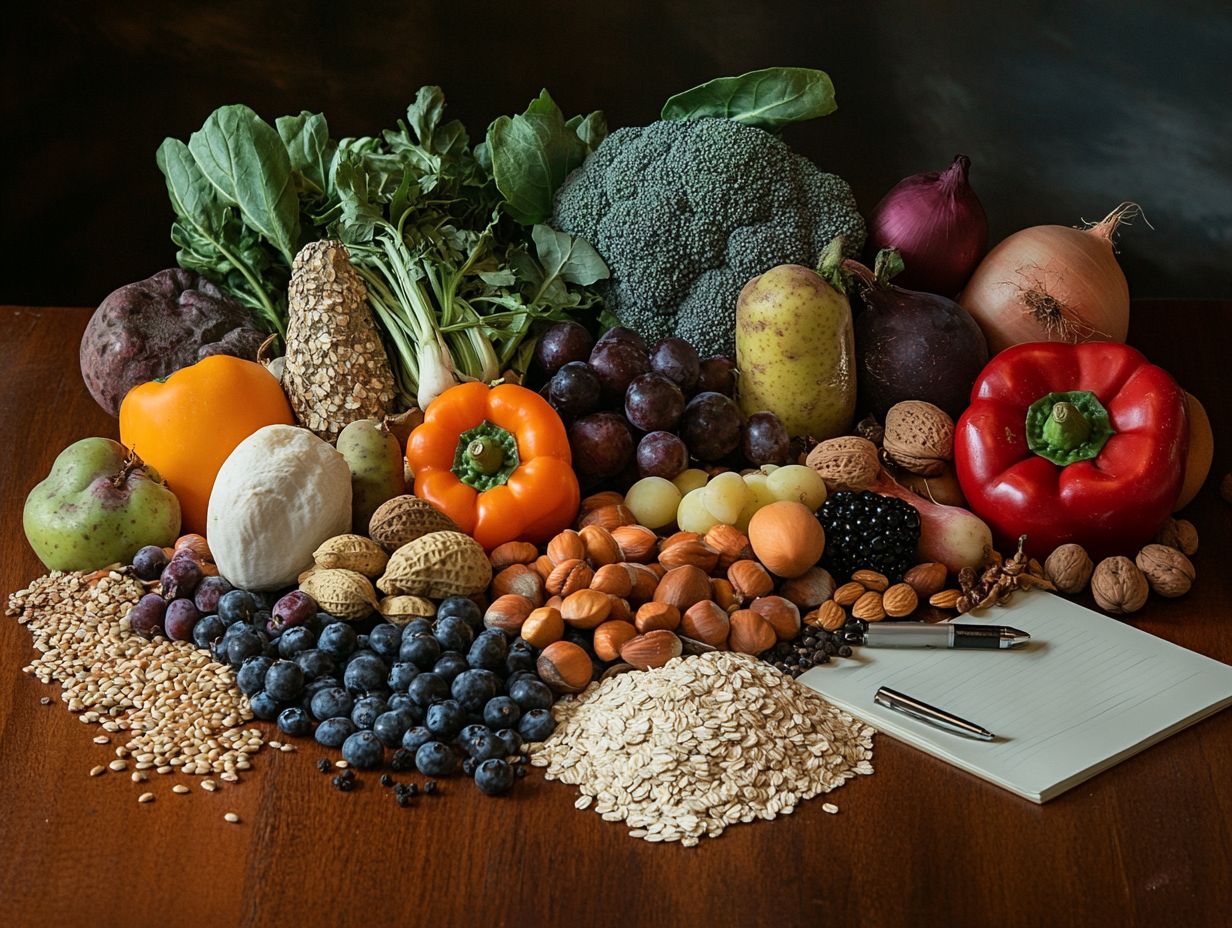
Vegetables are a key component of the Vegan AIP Diet, offering a wide range of health benefits due to their high nutrient density and fiber content. These plant-based foods are essential for promoting gut health and reducing inflammation while ensuring individuals meet their nutrient requirements.
AIP-friendly vegetables include leafy greens, cruciferous vegetables, and root vegetables, each providing unique health benefits that support overall wellness.
- Leafy greens, such as spinach and kale, are rich in vitamins A, C, and K, along with important minerals like magnesium and calcium, which are vital for bone health and immune function.
- Cruciferous vegetables, including broccoli and Brussels sprouts, are abundant in antioxidants and sulforaphane—compounds known to help reduce oxidative stress and promote detoxification.
- Root vegetables, such as sweet potatoes and carrots, offer complex carbohydrates, fiber, and beta-carotene, an essential nutrient for vision and skin health.
2. Fruits
Fruits are essential components of the Vegan AIP Diet, serving as excellent sources of antioxidants and vital vitamins that contribute to overall health and wellness. Incorporating a wide variety of fruits enhances flavor and increases nutrient intake, which is particularly important for individuals with autoimmune disorders.
AIP-friendly fruits, such as berries, apples, and bananas, offer significant benefits, including immune system support and inflammation reduction.
Berries are rich in antioxidants, which help reduce oxidative stress, while apples provide soluble fiber that aids digestion and promotes gut health. Bananas are an excellent source of potassium, necessary for maintaining fluid balance and muscle function, making them a convenient snack option.
Citrus fruits, like oranges and grapefruits, are high in vitamin C, which is crucial for the immune response, especially for those taking anti-inflammatory medications.
The diverse array of AIP-friendly fruits not only offers a variety of flavors but also plays a vital role in symptom management, long-term vitality, and overall health.
3. Plant-Based Proteins
Plant-based proteins play a crucial role in the Vegan AIP Diet by providing essential nutrients that promote overall health and support immune function. With a diverse selection of sources, including legumes, nuts, and seeds, individuals can meet their nutritional needs while adhering to the principles of the AIP diet. These protein sources are not only vital for muscle health but also significantly contribute to inflammation management and the body’s healing processes.
In their AIP-compliant forms, the following foods can be valuable components of the Vegan AIP Diet, adhering to dietary guidelines and restrictions:
- Chickpeas (Garbanzo beans): High in protein, fiber, and B vitamins, chickpeas support gut health and energy metabolism.
- Lentils: Low in fat and high in protein, lentils serve as a healthy meat alternative, offering iron and B vitamins while being low-calorie.
- Pumpkin seeds: Rich in protein and healthy fats, pumpkin seeds provide magnesium, manganese, copper, and zinc, all of which are essential for optimal immune response and energy levels.
- Almonds: Packed with protein, healthy fats, and vitamin E, almonds are beneficial for maintaining energy levels and supporting heart health. Additionally, almonds offer significant antioxidants and play a role in reducing inflammation.
The AIP diet is designed as a short-term elimination and reintroduction approach to identify food sensitivities and promote gut healing. However, it’s important to maintain a balanced diet. Plant-based protein sources should be complemented with a diverse array of fruits and vegetables to ensure the body receives the vitamins and minerals that these protein sources may lack. This balanced dietary approach can help manage autoimmune disorders effectively.
By incorporating a variety of plant-based protein options into the Vegan AIP Diet, individuals can achieve a more balanced nutritional intake and support long-term adherence to the AIP framework, which aligns with wellness strategies focused on chronic inflammation and autoimmune conditions.
4. Healthy Fats
Healthy fats play a crucial role in the Vegan AIP Diet by providing essential energy and promoting a balanced intake of nutrients. Sources of healthy fats, such as avocados, olive oil, and coconut oil, enhance flavor while offering a variety of health benefits, including improved heart health and reduced inflammation, which is a key consideration for managing autoimmune diseases.
Incorporating nutrient-dense foods allows individuals on the Vegan AIP Diet to better support their overall wellness and immune response. Other valuable sources of healthy fats include seeds like chia and flaxseeds, which are rich in omega-3 fatty acids that support brain function and help reduce inflammation, addressing dietary sources of anti-inflammatory nutrients.
Nuts such as walnuts and almonds can also be consumed in moderation to provide essential vitamins and minerals. These fats are vital for hormone production and nutrient absorption, which is particularly important for those pursuing a plant-based lifestyle that aligns with the autoimmune protocol diet.
Individuals following the Vegan AIP Diet should be mindful of their fat sources and seek whole, unprocessed options that not only comply with dietary restrictions but also promote long-term health benefits and manage health effects associated with autoimmune conditions.
What Foods Should Be Avoided on a Vegan AIP Diet?
The Vegan AIP Diet necessitates the exclusion of specific foods that may promote inflammation and trigger autoimmune responses, which are central to understanding dietary practices for managing autoimmune diseases.
The primary food categories that must be eliminated include:
- Grains
- Legumes
- Nightshade vegetables
as these foods are known to contribute to leaky gut and other gut-related issues, which are pivotal in autoimmune protocol dietary guidelines. Additionally, it is important to avoid processed foods high in sugars and unhealthy fats to support overall gut health and wellness, thereby reducing health risks and promoting longevity.
1. Grains
Grains are typically excluded from the Vegan AIP Diet because they are thought to trigger inflammatory responses and increase health risks for individuals with autoimmune conditions. Common grains such as wheat, barley, and rye contain gluten, which can provoke harmful reactions in those with autoimmune disorders, including celiac disease and Hashimoto’s thyroiditis, which are common autoimmune conditions.
Removing grains from the diet can help reduce gut inflammation and promote healing, aligning with dietary strategies to manage autoimmune disorders. Other grains, such as corn and oats, are often considered gluten-free but may still contain cross-reactive proteins that can trigger similar immune responses in sensitive individuals.
Additionally, the presence of anti-nutrients like lectins and phytates in many grains can hinder nutrient absorption and exacerbate digestive issues for those with autoimmune conditions. Research studies indicate that eliminating these grains from the diet may provide symptom relief and enhance overall well-being, making it essential for individuals to assess their own grain consumption and select anti-inflammatory foods prudently for effective disease management.
2. Legumes
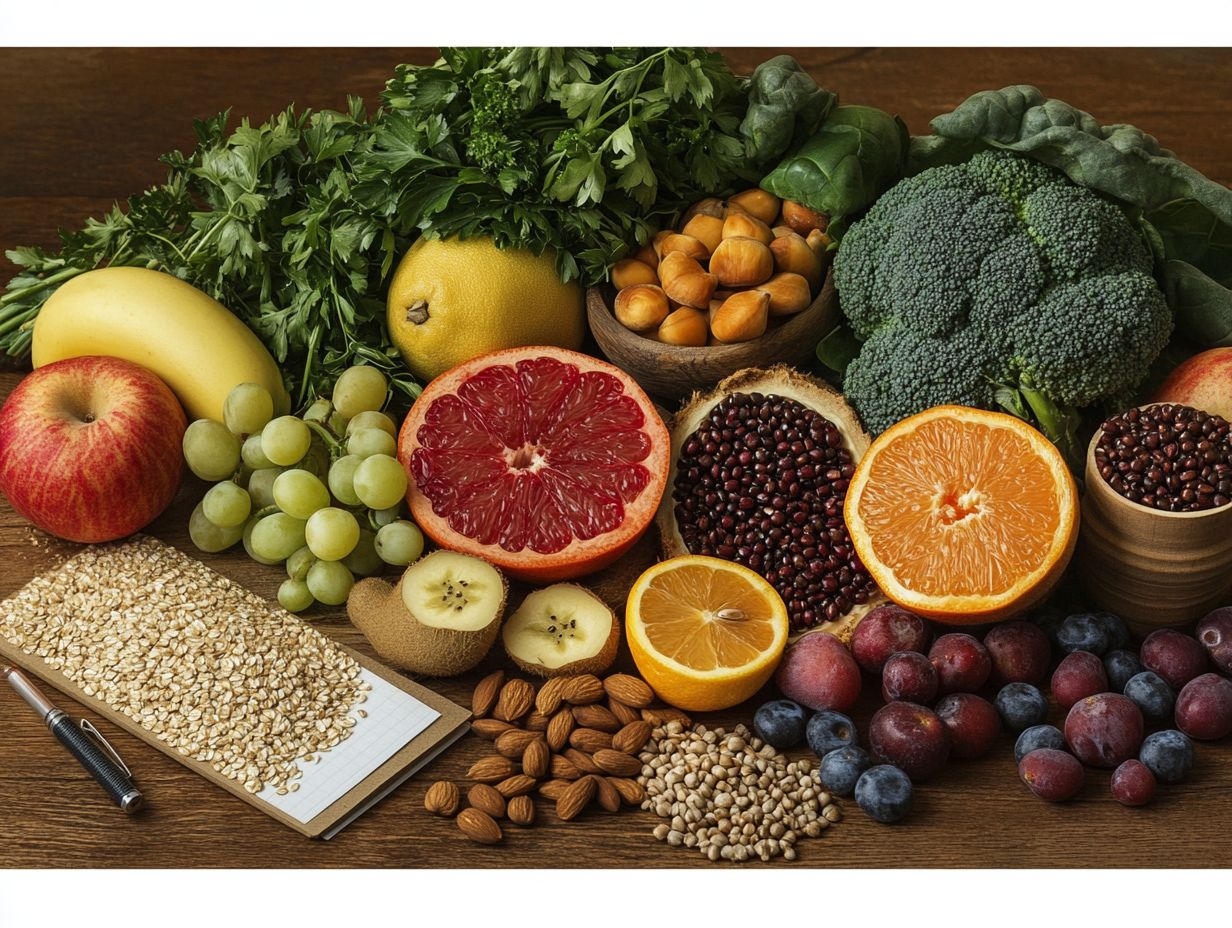
Legumes are typically regarded as a healthy food group; however, they are often excluded from the Vegan AIP Diet due to their tendency to cause food reactions and digestive issues, which are critical to consider within autoimmune protocol guidelines.
Foods such as beans, lentils, and chickpeas may not only contribute to inflammation but can also lead to complications for individuals with autoimmune disorders like lupus and rheumatoid arthritis. Eliminating these items can significantly improve gut health and overall wellness, especially for those who already have gut sensitivities or inflammatory conditions.
Legumes contain compounds like lectins and phytates, which can irritate the digestive tract. These antinutrients can interfere with nutrient absorption and exacerbate symptoms such as bloating, gas, and discomfort. Although legumes are high in fiber and beneficial for many, they can pose challenges for those on a restricted diet, potentially causing digestive disturbances and impacting dietary balance.
Therefore, removing legumes from the diet is not only helpful for reducing inflammation but also allows for a more balanced and gentle approach to nourishment, emphasizing the importance of dietary restrictions and guidelines in managing health effects.
3. Nightshade Vegetables
Nightshade vegetables, such as tomatoes, potatoes, and eggplants, are typically avoided on the Vegan AIP Diet because they are associated with inflammatory responses and health risks for individuals with autoimmune conditions.
The alkaloids present in nightshade vegetables can worsen symptoms in sensitive individuals, making their elimination a crucial aspect of a diet aimed at reducing inflammation. Along with alkaloids, nightshades contain high levels of solanine and other glycoalkaloids, which may further contribute to discomfort and inflammation for those sensitive to these compounds.
For individuals with autoimmune diseases, even minor inflammatory triggers can result in painful and potentially dangerous setbacks in their health. By avoiding nightshade vegetables, individuals following the Vegan AIP Diet can create a more stable internal environment that promotes healing.
4. Processed Foods
Processed foods have numerous negative health impacts and are prohibited in the Vegan AIP Diet due to their often unhealthy additives, preservatives, and high sugar content, all of which can promote inflammation and negatively affect autoimmune conditions. These foods can lead to nutrient deficiencies and worsen symptoms of autoimmune diseases, making their elimination essential for effective disease management and wellness approaches.
In contrast, consuming whole, nutrient-dense foods can significantly enhance health and quality of life by mitigating inflammatory responses. The widespread consumption of processed foods contributes to increased oxidative stress and chronic inflammation, both of which are detrimental to overall well-being and emphasize the importance of dietary changes.
Fresh fruits, vegetables, nuts, and seeds, which are rich in antioxidants and vital vitamins, can greatly improve the health of those seeking to enhance their well-being and effectively support the immune response. For instance, opting for crunchy carrot sticks or guacamole instead of processed snacks like chips provides essential nutrients while helping to reduce inflammation.
Additionally, choosing whole grains such as quinoa or brown rice over refined grains can help regulate blood sugar levels and increase fiber intake, enhancing dietary balance. Ultimately, selecting these healthy alternatives nourishes the body and supports a balanced diet in alignment with the goals of the Vegan AIP Diet, while focusing on essential nutrient requirements and dietary practices.
How to Follow a Vegan AIP Diet: A Step-by-Step Guide
Following the Vegan AIP Diet involves a series of systematic steps to facilitate dietary changes and achieve health improvements.
This guide will assist individuals in understanding the principles of the Vegan AIP Diet, including how to create a meal plan, shop for AIP-appropriate foods, and prepare nutritious meals that align with their health goals.
Additionally, consulting with a health professional can provide valuable support during this transition.
1. Educate Yourself on AIP Principles
Understanding the principles of the Vegan AIP Diet is an essential first step in effectively treating autoimmune disorders and optimizing gut health and wellness approaches. Familiarity with the elimination phase and the reintroduction phase will enable you to identify food triggers and develop dietary strategies that align with your health goals and address dietary guidelines.
It is crucial to comprehend the role of specific foods in your body and how they affect your overall well-being and vitality, particularly when managing inflammatory bowel disease. The elimination phase serves as the initial key step, as it involves removing potentially inflammatory and irritating foods, allowing you to pinpoint which foods may be beneficial or harmful.
Following this, the reintroduction phase permits you to gradually reintroduce foods one at a time to determine their effects on your health. This process will help you identify specific food intolerances and sensitivities, while also providing greater dietary flexibility in the future. Ultimately, this knowledge will give the power to you to create a sustainable lifestyle that meets your health needs and supports your objectives, considering the health benefits and potential health risks involved.
2. Create a Meal Plan
A well-structured meal plan is essential for the success of the Vegan AIP Diet, as it ensures that dietary changes are both sustainable and nutritionally adequate, addressing nutrient requirements effectively. Meal plans for AIP diets should include a diverse array of nutrient-dense, AIP-compliant foods, allowing individuals to manage their symptoms while promoting gut health simultaneously and supporting overall quality of life. A thoughtfully designed meal plan can also help maintain dietary variety, which is crucial for long-term adherence and symptom management.
To begin, researching and selecting AIP-compliant foods requires time and effort, but the rewards are significant. Focusing on the foundational importance of root vegetables, leafy greens, fruits, and healthy fats, such as avocado and coconut oil, is an excellent starting point, aligning with dietary sources of essential nutrients. Consulting with a health professional can provide guidance tailored to specific health improvement goals and lifestyle factors.
Additionally, the cooking methods used can greatly impact nutrient preservation and inflammation; steaming, roasting, and slow-cooking tend to retain nutrients better than frying or high-temperature cooking.
As an example of a weekly meal plan on the AIP Diet during the elimination phase, one could enjoy a hearty sweet potato and kale soup, grilled zucchini, and marinated tofu for lunch. For dinner, a dish of curry and quinoa would provide a balanced macronutrient profile while offering anti-inflammatory benefits that may help reduce the potential for flare-ups and improve gut health. Ensuring dietary variety in this weekly plan will aid in symptom management and dietary balance while making meals enjoyable.
3. Shop for AIP-Friendly Foods

Shopping for AIP-friendly foods is a crucial aspect of following the Vegan AIP Diet, requiring knowledge of which foods to purchase and where to find them to avoid food triggers. When seeking AIP-friendly options, it is important to focus on whole, unprocessed foods that adhere to AIP guidelines and reduce the risk of leaky gut. This approach not only maximizes health benefits but also minimizes the risk of illness caused by food triggers and processed foods. By doing so, individuals can stock an AIP-friendly pantry with nutrient-dense foods that support overall well-being.
Shopping for AIP-friendly foods involves several key practices:
- Learning to Read Labels: Mastering the skill of reading labels is essential, as many processed products may contain hidden ingredients that do not comply with AIP guidelines, which can impact inflammation and gut health. Look for items that are labeled as free from common allergens and additives, featuring simple and recognizable ingredients.
- Finding Local and Seasonal Ingredients: Opting for local and seasonal produce enhances flavor and ensures that the foods consumed are at their freshest, most nutritious, and beneficial for autoimmune conditions. Seasonal foods are often sourced from local farms, which means shorter transport times and support for local economies.
Choosing AIP-friendly foods is just one component of following the Vegan AIP Diet; effective shopping for these foods is equally important to ensure a healthy dietary journey.
4. Prepare and Cook Your Meals
Proper meal preparation and cooking techniques are essential for successfully following the Vegan AIP Diet, as they ensure that meals comply with AIP guidelines while remaining nutritionally balanced.
Techniques such as steaming, sautéing, and roasting enhance the flavors of nutrient-dense foods while preserving their health benefits and supporting dietary requirements. By prioritizing fresh ingredients and AIP-compliant cooking methods, individuals can create delicious meals that align with their dietary goals.
Exploring various cooking techniques can introduce a wide range of flavors while adhering to the principles of the diet. For example, using a slow cooker simplifies meal preparation and allows flavors to meld beautifully, resulting in hearty stews and soups that are rich in nutrients and align with dietary strategies.
Marinating vegetables in AIP-friendly ingredients before grilling can elevate their taste and texture while minimizing health risks. Additionally, blending spices like turmeric and ginger into sauces not only boosts flavor but also infuses meals with potent anti-inflammatory properties, aiding in the management of autoimmune disorders and supporting overall well-being.
Understanding these techniques lays the groundwork for diverse and satisfying meals that meet both dietary needs and culinary cravings, essential for those with autoimmune diseases.
5. Listen to Your Body and Make Adjustments
Listening to your body and making dietary adjustments is a crucial aspect of adhering to a Vegan AIP Diet, especially during the reintroduction phase. This practice enables individuals to modify their meals according to their health reactions and personal preferences, which can lead to improved symptom management and overall wellness.
By paying attention to how different foods affect their bodies and adjusting their meal plans accordingly, individuals can create a customized approach that addresses their specific health needs, such as reducing chronic inflammation and maintaining a healthy digestive tract.
To enhance self-awareness regarding their diet, individuals may consider maintaining a detailed food journal that tracks not only the foods they consume but also any immediate or delayed reactions that occur. This can help identify potential triggers and allow for the design of a meal plan that minimizes discomfort while maximizing nutrition and managing autoimmune responses.
Engaging in mindful eating—taking the time to savor the taste and texture of foods—can also improve awareness of the body’s cues for appetite and fullness. Additionally, working with a health professional knowledgeable about the Vegan AIP paradigm can be beneficial, as they can offer personalized guidance that aligns with individual goals and supports long-term adherence to the diet.
Tips for Success on a Vegan AIP Diet
Achieving success on a Vegan AIP Diet requires the implementation of several strategies that facilitate long-term changes to both diet and lifestyle, including managing inflammatory responses and improving quality of life.
One effective approach is batch cooking and meal preparation; by preparing meals in advance and making large batches of AIP-compliant dishes, individuals save time and effort while ensuring they have easy access to food that meets their dietary needs.
Additionally, experimenting with new recipes and ingredients can help maintain interest in the diet, making it easier to adhere to by providing exciting and diverse options.
Staying hydrated by drinking an adequate amount of water is also essential for overall health, as it can enhance energy levels, digestion, and the body’s healing processes.
Furthermore, prioritizing sleep and rest is crucial for overall well-being; getting enough sleep and allowing the body to recover can significantly improve an individual’s ability to stick to their dietary choices.
1. Batch Cook and Meal Prep
Batch cooking and meal prep are effective strategies for individuals following a Vegan AIP Diet, as they ensure easy access to nutrient-dense foods throughout the week while saving time.
By preparing meals in advance, individuals can avoid the temptation of non-compliant foods and simplify the cooking process. This approach not only encourages adherence to the diet but also promotes overall health, wellness, and disease management.
Having a meal plan enhances consistency and reduces the stress associated with daily cooking, making the Vegan AIP Diet easier to maintain and supporting overall health improvement. Spending a few hours on the weekend batch cooking staple foods such as grains, legumes, and roasted vegetables can be highly beneficial.
These items can be stored in portioned containers, allowing for quick meal assembly during the week, supporting a consistent dietary practice.
Soups and stews can be prepared and stored in freezer-safe bags, making it convenient to reheat them in boiling water without sacrificing flavor or texture.
Incorporating a variety of herbs and spices can keep the flavors interesting and help reinforce a commitment to a healthy lifestyle.
2. Experiment with New Recipes and Ingredients
Experimenting with new recipes and ingredients is an excellent way to keep the Vegan AIP Diet both interesting and enjoyable while promoting dietary variety. Trying out different cooking methods and flavor combinations allows individuals to discover innovative ways to incorporate healthy fats and nutrient-rich foods into their meals.
This culinary exploration not only keeps meals exciting but also encourages adherence to AIP guidelines. For instance, using jicama as a crunchy substitute for potatoes or replacing grains with tiger nuts in baked goods can introduce new flavors and textures.
Additionally, rotating herbs and spices such as fresh basil or turmeric enhances both the taste and nutritional value of dishes. Variety is crucial as it ensures a balanced intake of essential nutrients and helps prevent meal fatigue.
By diversifying their plates, individuals following the Vegan AIP Diet can establish a sustainable eating pattern that keeps them motivated on their journey toward better health and manages autoimmune conditions.
3. Stay Hydrated and Get Enough Sleep
The importance of staying hydrated and getting sufficient sleep for those following a Vegan AIP Diet is essential for maintaining a healthy lifestyle, as these factors significantly impact overall health, immune response, and immune function. Proper hydration enhances digestive health, fiber intake, and nutrient absorption, while adequate sleep is vital for recovery and stress reduction. Together, these elements contribute to better health outcomes and improved symptom management.
Individuals with autoimmune diseases face unique challenges that make optimal hydration and restorative sleep even more crucial.
To foster better hydration habits, they can focus on:
- Drinking fluids throughout the day by setting reminders on their phones
- Keeping a water bottle within reach
- Infusing water with fresh fruits and herbs for added flavor
To improve their sleep habits, they can establish a pre-bed relaxation routine that may include gentle yoga or meditation. These simple adjustments give the power to individuals to take greater control over their health and support their bodies in healing more naturally.
4. Seek Support from Others
Having a support network is essential for the long-term success of the Vegan AIP Diet. Sharing experiences and receiving encouragement from others can significantly boost motivation and help individuals overcome obstacles in following the diet. Support can come from family, friends, local groups, or online communities, all of which can enhance adherence to the Vegan AIP Diet and contribute to lasting success.
Connecting with others allows for the exchange of recipes, meal planning techniques, and coping strategies, making the transition to a Vegan AIP Diet easier and more enjoyable by sharing wellness approaches. Participating in community activities such as cooking or nutrition classes, or attending support group workshops, can foster a sense of community and accountability, which is crucial for managing autoimmune protocol diet and dietary changes effectively.
For those who may not have a natural support network, resources such as social media, local Facebook groups, or websites dedicated to either vegan or AIP lifestyles can be incredibly valuable. These interactions not only provide practical assistance in adhering to the Vegan AIP Diet, which is part of the broader autoimmune protocol, but also contribute to emotional well-being by creating a sense of community and shared commitment. Understanding food triggers and dietary restrictions is crucial in managing autoimmune disorders and chronic inflammation. Thus, resources not only aid in dietary strategies, such as the elimination phase and reintroduction phase, but also in improving gut health and overall quality of life.
